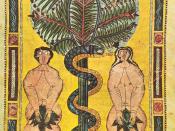Theology, September song, and National Trust are works of Hughes, Hill and Harrison, which all speak of situations in the past that have affected society to the present day. As for other works of these poets such as Examination at the Womb Dorr, In Memory of Jane Fraiser, and Book Ends, each deals with the struggle of death. These poems recite different aspects of how the consequence of death reaches us all.
Hughes' point in writing Theology shows how fools God and remains in his garden of Eden smiling happily while Adam and Eve are resting in the serpent's stomach. Hughes changed how original sin was committed; Adam has eaten the apple, then Eve ate Adam, and the serpent consumed both. He simply states how Eve eating the apple is corruption of the facts. If this is the case and Adam ate the apple, it shows that who believes in Eve creating original sin is wrong.
It also changes much of religion; the one major belief is original sin, which explains how all humans were created. If the base of human creation is changed, how are we all living today?
While Hughes changes all of human creation, Hill reminds us of the many people that have died because of religious belief. September Song speaks of all the Jews that were gassed in the concentration camps. With Hill's monotone words the sense received after reading this poem is that these people were no loss, it did not matter if they died or not.
When in all actuality this period affected us all and still is to this day. Many relatives were lost and families were destroyed. Hill speaks of the routine schedules the Jews lived once in these camps. He shows how even the cries were routine, and nothing mattered to...


